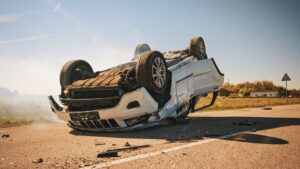Reckless driving in Texas can take several forms, but it usually occurs when another driver fails to watch the road attentively, speeds up, or violates another traffic law. When people drive recklessly, they significantly heighten their chances of causing a severe traffic accident, which leads to debilitating injuries for other drivers and their passengers. If you sustained injuries in a recent Texas reckless driving accident, a car accident lawyer can determine your eligibility for filing a personal injury claim. Your attorney may draft a settlement demand letter and forward the documentation to the at-fault driver's insurer. If the insurance company does not offer a fair monetary settlement, your attorney can pursue a favorable litigation outcome in the state court system.
Types of Reckless Driving
In Texas, reckless driving encompasses various behaviors that endanger public safety. One prevalent form is speeding, where drivers exceed posted limits, ignoring the potential consequences. Tailgating, or following too closely, is another common type, often resulting in rear-end collisions that can lead to serious injuries. Aggressive driving, which involves aggressive maneuvers like abrupt lane changes and weaving through traffic, contributes significantly to reckless driving incidents on Texas roads. Driving under the influence (DUI) is a serious offense in Texas, constituting reckless behavior that poses a severe threat. Intoxicated drivers compromise their ability to operate a vehicle safely, leading to a higher risk of accidents. Similarly, distracted driving – often associated with smartphone use – diverts attention from the road, increasing the likelihood of crashes. Failing to obey traffic signals and signs is another prevalent form of reckless driving in Texas, as it disregards established rules to maintain order and safety on the roads. Running red lights or stop signs can lead to dangerous intersections, resulting in collisions with severe consequences. Reckless driving in Texas also includes aggressive highway actions like racing or engaging in speed contests. These behaviors endanger the participants and put other road users at significant risk. Reckless driving is not just limited to individual drivers. Commercial vehicle operators who engage in aggressive maneuvers or violate safety regulations contribute to the overall issue. Texas law enforcement takes reckless driving seriously, as it jeopardizes public safety. Offenders may face fines, license suspension, or even imprisonment, depending on the severity of their actions. In addition, reckless drivers who cause accidents that lead to injuries can be responsible for their actions via a personal injury claim or lawsuit. In that instance, the at-fault driver's insurance company may have to pay the injured accident victim monetary compensation in the form of damages.Accidents that may result from Reckless Driving
 Reckless driving in Texas can lead to various types of motor vehicle collisions, posing significant risks to other drivers, passengers, and pedestrians alike. One common consequence is the rear-end collision, where a driver tailgating or traveling excessively fails to stop quickly, striking the vehicle in front. These accidents often result in whiplash and property damage.
Another prevalent type is the side-impact collision, occurring at intersections when a reckless driver disregards traffic signals or fails to yield the right-of-way. T-bone accidents, as they are commonly known, can cause severe injuries, especially if the collision occurs on the driver or passenger side of the vehicle.
Reckless driving also contributes to rollover accidents, particularly high-speed maneuvers or sudden lane changes. SUVs and large commercial trucks are particularly susceptible to rollovers, posing a higher risk of injury to occupants.
Additionally, aggressive driving behaviors like weaving in and out of traffic can lead to sideswipe collisions, causing vehicle damage and, in some cases, resulting in a chain reaction of crashes.
Head-on collisions are among the most devastating outcomes of reckless driving, often resulting from drivers who exceed speed limits, driving under the influence, or engage in dangerous overtaking maneuvers. These collisions typically result in severe injuries and fatalities due to the combined force of the two vehicles colliding directly.
Suppose you suffered injuries in one of these types of reckless driving accidents. In that case, your car accident lawyer can take the necessary legal steps and file a claim with the responsible driver's insurance company.
Reckless driving in Texas can lead to various types of motor vehicle collisions, posing significant risks to other drivers, passengers, and pedestrians alike. One common consequence is the rear-end collision, where a driver tailgating or traveling excessively fails to stop quickly, striking the vehicle in front. These accidents often result in whiplash and property damage.
Another prevalent type is the side-impact collision, occurring at intersections when a reckless driver disregards traffic signals or fails to yield the right-of-way. T-bone accidents, as they are commonly known, can cause severe injuries, especially if the collision occurs on the driver or passenger side of the vehicle.
Reckless driving also contributes to rollover accidents, particularly high-speed maneuvers or sudden lane changes. SUVs and large commercial trucks are particularly susceptible to rollovers, posing a higher risk of injury to occupants.
Additionally, aggressive driving behaviors like weaving in and out of traffic can lead to sideswipe collisions, causing vehicle damage and, in some cases, resulting in a chain reaction of crashes.
Head-on collisions are among the most devastating outcomes of reckless driving, often resulting from drivers who exceed speed limits, driving under the influence, or engage in dangerous overtaking maneuvers. These collisions typically result in severe injuries and fatalities due to the combined force of the two vehicles colliding directly.
Suppose you suffered injuries in one of these types of reckless driving accidents. In that case, your car accident lawyer can take the necessary legal steps and file a claim with the responsible driver's insurance company.
Injuries in Reckless Driving Accidents
Reckless driving car accidents can cause various injuries, ranging from mild to severe – and in some tragic cases, fatal. Whiplash is a common injury, often resulting from sudden stops or rear-end collisions, causing the neck to jerk forward and backward rapidly. This movement can lead to neck pain, stiffness, and headaches. Head injuries are also prevalent in reckless driving accidents, especially if occupants are not wearing seatbelts. Traumatic brain injuries (TBIs) can occur due to the force of the collision, leading to concussions, contusions, or more severe brain damage. These injuries may have long-lasting effects on memory, cognitive ability, and overall quality of life. Chest injuries can result from the force of the impact, causing rib fractures, lung contusions, or damage to internal organs. Airbag deployment, while a safety feature, can also lead to injuries – particularly facial injuries, burns, or broken bones. Spinal cord injuries are another grave consequence of reckless driving accidents, potentially resulting in paralysis or long-term disability. The force of the collision can damage the spinal cord, affecting motor and sensory functions below the injury site. Extremity injuries, such as fractures, dislocations, or severe lacerations, are also common in car accidents, especially those involving high speeds or multiple vehicles. The collision force may throw a vehicle occupant against hard surfaces in the vehicle or crush them within the vehicle, leading to significant arm, hand, or leg injuries. Psychological trauma is another aspect of injuries resulting from reckless driving accidents. Survivors may experience post-traumatic stress disorder (PTSD), anxiety, or depression due to the emotional effects of the crash. Suppose you suffered any of these injuries in a reckless driving accident. In that case, your car accident attorney can begin assembling your claim documents while you focus all of your attention on getting better.Evidence in a Reckless Driving Accident Case
Building a strong case for a reckless driving car accident claim or lawsuit involves gathering compelling evidence to support your case. Evidence plays a crucial role in establishing liability and demonstrating the extent of the damages you incurred. Key pieces of evidence in a car accident case may include:- Witness Statements – Collect statements from individuals who witnessed the accident. Eyewitness accounts can provide valuable perspectives on the events leading up to the crash and help corroborate your version.
- Medical Records – Gather comprehensive medical records detailing the injuries you sustained due to the accident. This includes hospital records, diagnostic tests, and statements from healthcare professionals about the nature and extent of your injuries.
- Traffic Violation Records – If the reckless driving involved traffic violations, obtain records or citations issued to the at-fault party. This can include speeding tickets, citations for running red lights, or other traffic offenses contributing to your accident.
- Photographic Evidence – Take photographs of the accident scene, roadway conditions, vehicle damage, and any relevant traffic signals or signs. Visual evidence can be a powerful tool in illustrating the collision's severity and supporting your personal injury claim or lawsuit.
- Police Reports – Obtain a copy of the police report filed at the accident scene. This document provides an official record of the incident, including details on the parties involved, statements from witnesses, and the officer's assessment of the situation – including whether or not they issued a traffic citation to the at-fault driver.
- Professional Testimony – Accident reconstruction specialists or medical professionals can provide testimony that supports your case. Professional opinions can carry significant weight in establishing the cause of your accident and the resulting injuries.
- Surveillance Footage – Check for any available surveillance footage from nearby businesses or traffic cameras. Video evidence can clearly depict the incident and capture details crucial in establishing the other driver's fault.
- Financial Documentation – Keep records of all expenses related to your accident, including medical bills, vehicle repair costs, and any other financial losses you incurred. This documentation helps to establish the economic effects of your accident.
Settlement Negotiations After a Reckless Driving Accident
 The settlement negotiation process in a reckless driving accident case is a critical phase where the parties involved attempt to resolve it without going through a lengthy trial.
Here's an overview of the key steps involved:
The settlement negotiation process in a reckless driving accident case is a critical phase where the parties involved attempt to resolve it without going through a lengthy trial.
Here's an overview of the key steps involved:
- Thorough Investigation and Documentation – Before entering into settlement negotiations, your car accident lawyer can thoroughly investigate the accident circumstances, gather evidence, and document damages. This includes medical records, accident reports, witness statements, and other relevant information that strengthens your case.
- Demand Letter – Your attorney may draft a settlement demand letter outlining the details of your accident, the injuries you sustained, and the damages you incurred. This letter typically includes a specific monetary demand for compensation. It is also a formal starting point for settlement discussions with the at-fault driver's insurance company.
- Counteroffer – The at-fault party or their insurance company will likely respond with a counteroffer. This back-and-forth process can continue until both parties reach an agreement or discontinue negotiations.
- Negotiation Strategies – Skilled negotiators may employ various strategies, including emphasizing the strength of the evidence, highlighting the severity of your injuries, and showcasing the potential risks and costs of going to trial. Both sides may engage in tactical bargaining to find common ground.
- Mediation – The parties may opt for mediation if initial settlement negotiations prove challenging. A neutral third party – the mediator – facilitates discussions and helps the parties reach a mutually acceptable settlement. Mediation can be a more efficient and cost-effective alternative to a trial.
Recovering Monetary Damages After a Reckless Driving Accident
In a reckless driving accident claim or lawsuit, individuals may seek various monetary damages to compensate for the losses due to the other driver's negligence. These damages may include compensation for:- Related Medical Expenses – Economic damages often include past and anticipated medical costs arising from injuries the accident victim suffered.
- Property Damage – Damages related to the vehicle or other property involved in the accident fall under economic damages.
- Lost Income and Future Earnings – Economic damages also account for the income lost due to injuries that prevented the accident victim from working. This includes income, bonuses, and other financial benefits. Additionally, if the injuries result in long-term or permanent impairment, the claimant may seek compensation for reducing future earning capacity.
- Pain and Suffering – Non-economic damages encompass intangible losses, such as the pain and suffering the accident victim endured due to the accident. This category aims to compensate for physical and emotional distress, including pain, anxiety, depression, and the overall effects on the victim's quality of life.
- Emotional Distress – Reckless driving accidents can lead to emotional trauma and psychological distress; both are compensable in a personal injury case.
- Loss of Consortium – In cases where injuries affect the accident victim's relationships, loss of consortium damages may be available.
- Punitive Damages – In extreme reckless driving cases involving gross negligence or willful misconduct, the accident victim may receive punitive damages.
Call an Experienced Car Accident Attorney Today about Your Reckless Driving Claim in Texas

